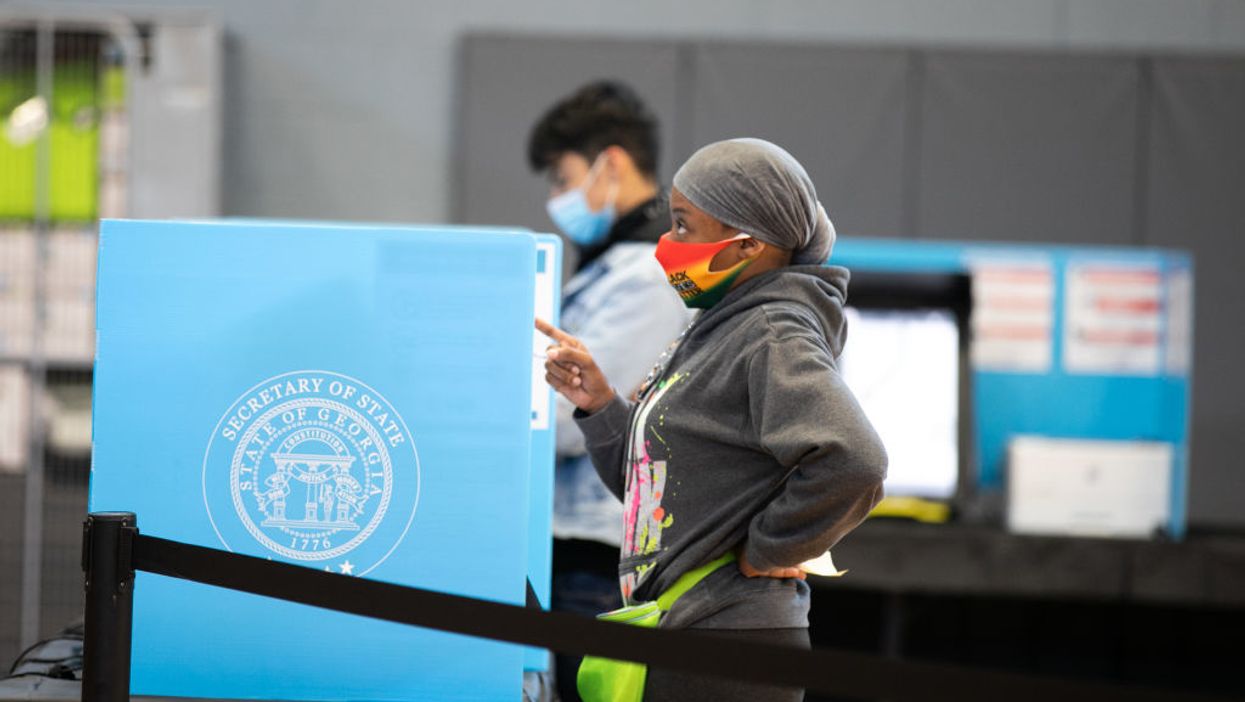
Jessica McGowan/Getty Images

An election night nightmare scenario is finally over
An election night nightmare scenario is finally over in Gwinnett County, Georgia, a suburban part of Atlanta where several tech problems last week caused a delay in ballot-counting in the middle of a contentious election. Nearly a week after the election, all of the votes, 416,458 to be precise, have been counted and the county results of the election have been certified.
Biden holds a mere 12,000-vote lead over Trump in Georgia, so when reports emerged that a "software glitch" in Gwinnett County prevented up to "80,000 absentee ballots" from being counted on the night of the election, voters nationwide were understandably concerned about the integrity of the process.
TheBlaze reached out to Gwinnett County for clarification on what happened, and county communications director Joe Sorenson explained the initial problems last Tuesday were caused by the machines that scan absentee ballots.
Georgia elections law allows county officials to begin scanning absentee and mail-in ballots on Oct. 19, but the county is not allowed to tabulate the results until Election Day. Going into election night, the county had prepared 118,000 received mail-in ballots for processing. Officials said Gwinnett County is unique in Georgia because each ballot is printed on two pages, front and back, one in English and another in Spanish. The ballots are processed in batches. Each batch can contain up to 50 pages, or 25 ballots.
"Absentee ballots are filled out by hand, and if a ballot is marked clearly, it will run through the scanner without a problem," Sorenson also told WXIA-TV in Atlanta. "If there's a problem with how the ballot was filled out — for example, a voter placed a check mark instead of filling in the circle, didn't completely fill in the circle, or voted for more candidates than allowed in a race — the scanning software will send the ballot to the adjudication module."
According to Sorenson, when a ballot is adjudicated because the scanning software could not read it, a three-person panel consisting of one Democrat, one Republican, and an election official will review the ballot to determine the intent of the voter. Say a voter was supposed to fill in a circle but instead marked an "X" for Donald Trump. The panel would look at the ballot and determine the voter meant to vote for Trump. The flagged ballot would be marked as adjudicated and the vote would be pushed forward to be counted.
Sorenson told TheBlaze that leading up to the election, Gwinnett County officials prepared 5,900 batches of ballots to be scanned and counted. About half of these batches, 2,700, were scanned, adjudicated, counted, and pushed forward Tuesday night. However, the software rejected 3,200 batches of ballots, showing that they still needed to go through the adjudication process even though they already had done so.
Because the ballots are scanned in batches, even if only one ballot needed to be reviewed, the entire batch could not be processed. So anywhere from 3,200 individual ballots to approximately 80,000 (every ballot in all 3,200 batches) needed to be reviewed and re-adjudicated before they could be counted.
When election officials realized this, they immediately contacted the Georgia secretary of state's office to inform them of the problem. They also contacted Dominion, the software company that makes the voting machines used by the county, for technical support. Given the unknown number of ballots affected, the Board of Voter Registrations and Elections decided to push the batches through Tuesday night knowing that many ballots would have to be re-adjudicated and the unofficial election results would likely change before they were made available to the public.
Sorenson directed TheBlaze to the Gwinnett County website, where officials published updates on the vote counting process beginning on Election Day and continuing until the process was complete to maintain transparency with voters.
On the day after the election, the county began to re-adjudicate the 3,200 batches of absentee ballots and announced the results would not be tallied and published until this process was complete. Recall that the adjudication process requires one Democrat, one Republican, and one election official to review the problem ballots. There is no evidence or indication that absentee votes received by Gwinnett County were illegally changed between Election Day and when the results were finally certified.
On the morning of Friday, Nov. 5, the re-adjudication process was completed. The only outstanding votes to count were absentee by mail ballots awaiting issues with their signatures to be resolved by a Nov. 6 deadline, provisional ballots, and overseas and military ballots. These remaining ballot issues are typical of every election year.
It is important to understand that the "results" reported by the media on election night everywhere in the country are not the final results certified by local governments to state governments across the nation. Official, certified election results are usually not available until a few days after the election. Georgia state law requires the secretary of state to certify the results of any election no later than 5:00 p.m. on the 17th day following said election. In other words, there is an expectation built into state law that it may take a little more than two weeks to have official election results finalized.
Gwinnett County certified the results of the election on Monday, Nov. 9, after all of the votes were counted. Joe Biden carried Gwinnett County with 58.39% of the vote, earning 241,827 votes. Donald Trump earned 166,413 votes, 40.18%. Turnout in this suburb was very high with 416,458 voters of 581,467 registered voters (71.62%) casting their ballots.